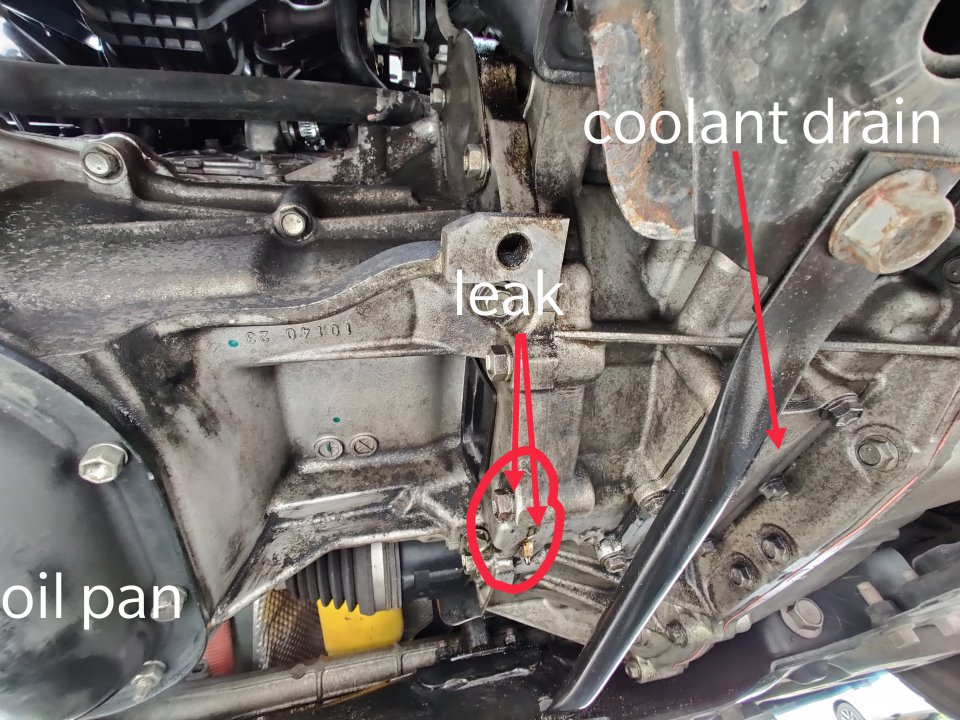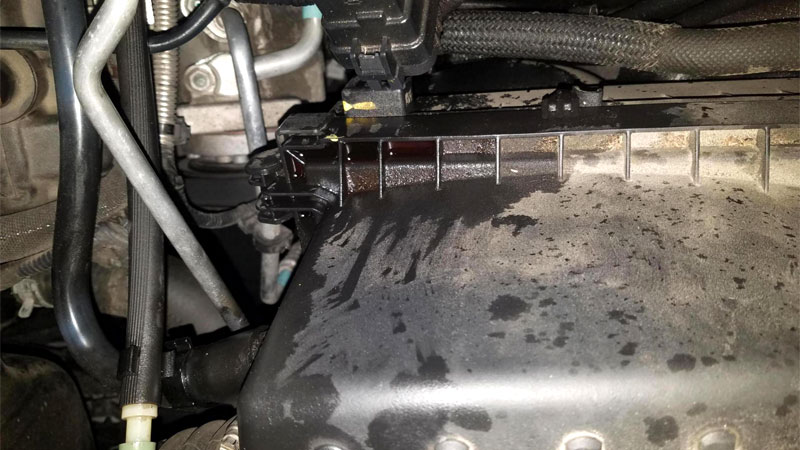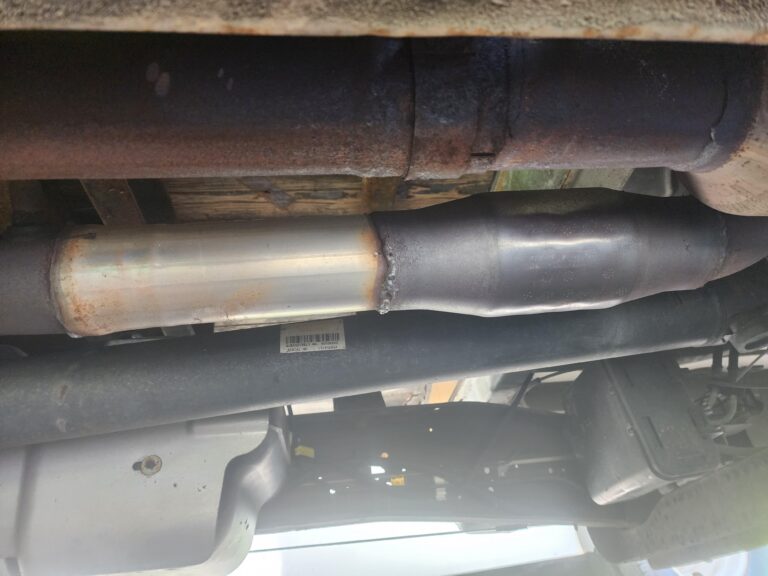How to Tell If You Have a Transmission Leak
To tell if you have a transmission leak, look for red fluid under your car. Check for a burnt smell too.
Detecting a transmission leak early can prevent costly repairs and keep your vehicle running smoothly. One common indication of a leak is seeing red fluid on the ground under your car. Additionally, if you notice a burnt smell coming from your vehicle, it could be a sign of a transmission issue.
Taking prompt action to address a potential leak can help maintain the efficiency and longevity of your vehicle’s transmission system. In this guide, we will explore the steps you can take to identify a transmission leak and the importance of addressing it promptly.

Credit: priuschat.com
Common Signs Of A Transmission Leak
Fluid Puddles Under The Vehicle
One of the most obvious signs of a transmission leak is the presence of fluid puddles underneath your vehicle after it has been parked for some time. Transmission fluid is usually reddish or brown in color, so look for puddles in those shades.
Burning Smell
If you notice a burning smell inside or around your vehicle, it could be a sign of a transmission leak. The fluid may be leaking onto hot engine components, causing it to burn and produce a distinct aroma.
Difficulty Shifting Gears
Experiencing problems shifting gears, such as hesitation, jerking, or grinding, can indicate a transmission fluid leak. Low fluid levels can impair the transmission’s ability to operate smoothly.
Leaking Transmission Fluid
Visible leaks or drips of transmission fluid on your driveway or garage floor are a surefire sign of a leak. The fluid may be viscous and slippery to the touch, often with a reddish brown color.
Transmission Slipping
If you notice your vehicle slipping out of gear, struggling to accelerate, or the engine revving without a corresponding increase in speed, it may be due to transmission fluid loss. This indicates a leak or low fluid levels.

Credit: autotrends.org
Causes Of Transmission Leaks
Transmission leaks can be a concerning issue that needs immediate attention. Here are some common causes:
Worn Gaskets Or Seals
Worn gaskets or seals can result in transmission leaks. These components can deteriorate over time, leading to fluid seepage.
Loose Or Damaged Transmission Pan
A loose or damaged transmission pan can also be a culprit. If the pan is not securely fastened or has any cracks, leaks may occur.
Faulty Transmission Lines
Faulty transmission lines are another potential source of leaks. Any issues with the lines can cause fluid to escape from the transmission system.
Cracked Torque Converter
A cracked torque converter can contribute to transmission leaks. Damage to this component can lead to fluid leakage over time.
Damaged Transmission Cooler
If the transmission cooler is damaged, it can cause leaks. A faulty cooler may not be able to properly regulate the transmission fluid temperature, resulting in leaks.
Steps To Diagnose A Transmission Leak
When it comes to diagnosing a transmission leak, following specific steps can help you pinpoint the issue accurately. To identify a transmission leak, it is essential to take systematic measures in inspecting fluid levels, checking for external leaks, monitoring transmission performance, visiting a mechanic, and utilizing a UV leak detection kit.
Inspecting Fluid Levels
Regularly checking the transmission fluid levels is crucial in detecting any potential leaks. Look for low fluid levels or discoloration that may indicate a problem.
Checking For External Leaks
Inspect the transmission components for any signs of visible leaks such as puddles of fluid underneath the vehicle or stains on the driveway.
Monitoring Transmission Performance
Pay attention to any irregularities in the transmission performance such as delayed shifting or slipping gears, which could be indicators of a leak.
Visiting A Mechanic
Seek professional assistance if you suspect a transmission leak. Experienced mechanics can conduct a thorough inspection and provide necessary repairs.
Using A Uv Leak Detection Kit
Utilize a UV leak detection kit to identify hidden leaks in the transmission system. This method involves using UV dye that reveals leaks under UV light.
Importance Of Fixing A Transmission Leak
H3 headings for Importance of Fixing a Transmission Leak:
Prevent Further Damage
A transmission leak can lead to severe damage if not addressed promptly. Fixing the leak prevents fluid loss, avoiding potential costly repairs down the line.
Improve Vehicle Performance
Fixing a transmission leak can enhance the overall performance of your vehicle. Consistent fluid levels ensure smooth gear shifting and efficient power transmission.
Extend Transmission Lifespan
Addressing a transmission leak promptly can significantly extend the lifespan of your transmission system. Preventing friction and wear due to inadequate fluid levels can prolong the longevity of the transmission.
Avoid Costly Repairs
Ignoring a transmission leak could lead to costly repairs in the future. By fixing the leak early on, you can avoid major component failures and the associated expenses.
Ensure Safety While Driving
A properly functioning transmission is crucial for safe driving. Fixing a leak ensures that your vehicle operates smoothly and reliably, reducing the risk of breakdowns or accidents.
Preventive Measures To Avoid Transmission Leaks
When it comes to your vehicle, proper maintenance is essential to ensure its longevity and prevent costly repairs. One area that requires attention is the transmission, as a transmission leak can lead to significant damage if left unchecked. By implementing a few simple preventive measures, you can avoid transmission leaks and keep your vehicle running smoothly.
Regular Transmission Maintenance
Maintaining your transmission is key to preventing leaks. Regularly checking the transmission fluid level is essential. Ensure that the fluid is at the appropriate level, neither too high nor too low. Additionally, regularly servicing your transmission, as recommended by the vehicle manufacturer, can help detect any potential issues before they become major problems.
Avoiding Excessive Heat
Excessive heat can cause damage to your transmission and increase the likelihood of leaks. Make sure your transmission is kept cool by avoiding heavy towing, particularly in hot weather. If you frequently drive in warm climates or engage in activities such as towing or racing that generate excessive heat, consider installing an external transmission cooler. This will help maintain optimal temperatures and reduce the risk of leaks.
Using The Right Transmission Fluid
Using the correct transmission fluid is crucial. Always consult your vehicle’s manual or contact a professional to ensure you are using the appropriate fluid for your specific transmission. Using the wrong fluid can cause damage and lead to leaks. Regularly check the fluid’s color and consistency; if it appears dirty or has a burnt smell, it may be an indication of a problem that should be addressed promptly.
Inspecting For Damaged Components
Regularly inspecting your transmission for damaged components can help prevent leaks. Look for signs of wear or damage, such as fluid stains or puddles underneath your vehicle. Pay close attention to seals, gaskets, and other vulnerable areas, as these are common areas for leaks to occur. If you notice any signs of damage or leaks, it is crucial to have your transmission inspected and repaired by a qualified professional as soon as possible to prevent further damage.
Careful Driving Habits
Finally, practicing careful driving habits can significantly reduce the risk of transmission leaks. Avoid abrupt acceleration or sudden shifts between gears, as these can put undue stress on your transmission. Additionally, avoid overloading your vehicle beyond its recommended capacity, as this can strain the transmission and increase the likelihood of leaks. By driving responsibly and being mindful of how you operate your vehicle, you can help ensure the long-term health of your transmission.

Credit: aamcoutah.com
Frequently Asked Questions On How To Tell If You Have A Transmission Leak
How Do You Check If Your Transmission Is Leaking?
To check if your transmission is leaking, park your vehicle on a level surface and let it run for a few minutes. Look for red or brown fluid under the car. If you notice a puddle or any dripping, it’s likely a transmission leak.
Seek professional help to diagnose and fix the issue.
Is It Expensive To Fix A Transmission Leak?
Fixing a transmission leak can vary in cost based on the extent of the damage. It’s important to get it checked by a professional to determine the specific repair needed. Depending on the issue, repairs can be affordable or more costly.
Regular maintenance can help prevent leaks and mitigate potential expenses.
Can You Drive With A Transmission Leak?
Yes, you can drive with a transmission leak, but it may cause damage if not fixed promptly.
Where Is The Most Likely Area For A Transmission To Leak?
The most likely area for a transmission to leak is the transmission pan gasket.
How Can I Tell If I Have A Transmission Leak?
You can look for red or brown puddles under your vehicle, check for a burning smell, or notice transmission fluid on the dipstick or on the ground.
What Causes Transmission Leaks?
Transmission leaks can be caused by worn gaskets, faulty seals, cracked transmission fluid lines, or a damaged transmission pan.
Is It Dangerous To Drive With A Transmission Leak?
Yes, driving with a transmission leak can be dangerous as low fluid levels can lead to transmission overheating and damage.
Conclusion
Being proactive about transmission leaks is crucial. Schedule regular inspections and fluid checks to prevent costly repairs and avoid safety hazards. If you notice any signs of a leak, address them promptly to maintain the health of your vehicle. Don’t delay—taking action now can save you time and money in the long run.

